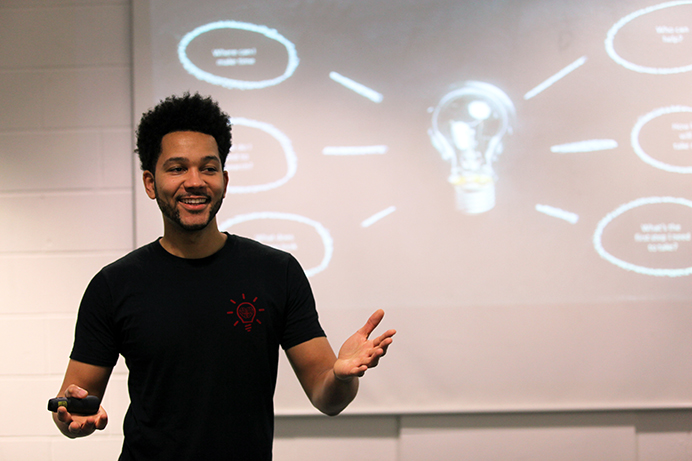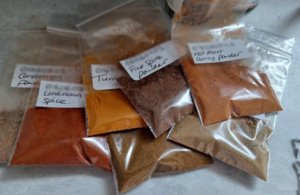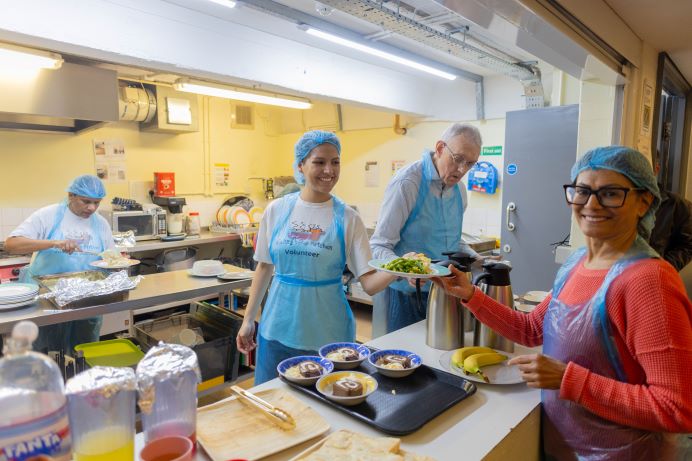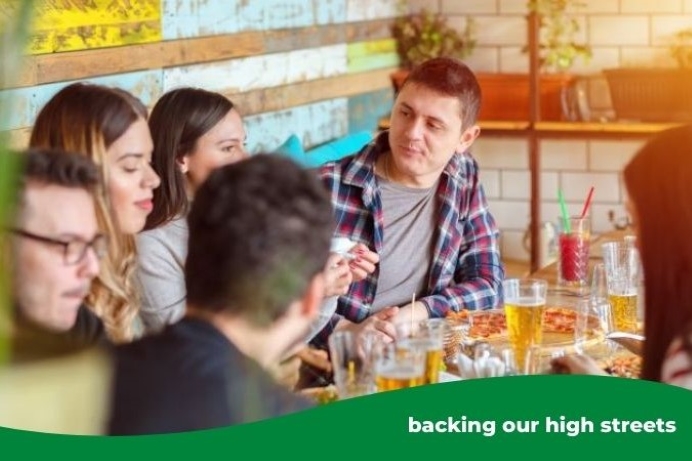It was Children’s Mental Health Week in February; and school students were told a true tale of how resilience and positive thinking changed the life of a man who nearly died as a teenager – and how it could change theirs, too.
In 2006, after returning from a school trip abroad, Anthony Bennett fell extremely ill with three viral infections targeting his lungs. His parents were told he had a 10% chance of survival and he needed to be resuscitated and brought back to life 12 times during a seven-week stay at Great Ormond Street Hospital (GOSH).

After making a full recovery and relearning how to walk, talk and breathe again without the aid of machines, he was asked to help GOSH raise funds by talking about his experiences. Although nervous, he did it – and he has not looked back since. He is now a motivational speaker who, among other things, visits local schools to give talks and hold workshops for pupils.
You can read Anthony’s story in full, in his own words, in an interview further down this article.
Recently he returned to his old school, Greenford High, where he held talks during the course of a whole week with different age groups.

“Going through my traumatic experience and then overcoming my fear of public speaking taught me a lot about myself and gave me a very positive outlook on life,” he told us.
Anthony is also a keen photographer and won Around Ealing’s autumn 2018 Seasons of Ealing photography competition (you can still see the shortlisted entries in our gallery section).
‘Strength to believe in themselves’
He shares his own experiences with students to help them to think about their lives differently, how to stay motivated and to think positively about themselves. He tackles bullying, procrastination, social media, dealing with setbacks and being resilient in the face of challenges.
“Feedback from pupils often expresses how the presentation has made them think differently about things,” said Anthony. “It’s given them strength to believe in themselves and to see life with a new perspective. Some teachers notice a positive change in their pupil’s behaviour directly after the sessions.
“Speaking with a group of year 7s is a different experience to speaking with year 13s. By breaking the school into smaller year-grouped assemblies, each group can be inspired and motivated in a way they best absorb it and at a level they connect with and enjoy.”

‘Genuinely inspirational effect’
Jeremy Dudman Jones, assistant headteacher at Greenford High, said: “Anthony’s presentations are a real triumph. Rarely can a speaker hold the audience so intently for such a long time but Anthony’s delivery, his anecdotes and his inspirational message of overcoming adversity were listened to by all our young adults with respect, enthusiasm and wide-eyed wonder. The change in people’s attitudes afterwards was palpable and clear.”
Councillor Yvonne Johnson, Ealing Council’s cabinet member for schools and children’s services, said: “Whether as family or friends, teachers or healthcare professionals, we all have a role to play in supporting young people through difficult times and in helping them cope with challenges and, more generally, to find self-belief.
“Sometimes, receiving positive messages from someone relatable who isn’t an ‘authority figure’ can be very effective and I was pleased to hear about these talks and the genuinely inspirational effect they appear to have had on pupils’ outlook.”
INTERVIEW: ‘If you say the word ‘no’, nothing changes’
You can watch Anthony explain more about his talks for students, in the video above. But we also had a chat with him to ask him to tell us his story in his own words – and also to explain what he tells the students that has such a big impact on them.
Tell me what you went through when you fell ill.
Anthony: On the third and final day of a school trip to Disneyland Paris in 2006, my friends and I were discussing what rides to go on next when, all of a sudden, I felt spaced out and couldn’t hold focus or make any sense of what people were saying. It was a weird feeling that kept coming and going, so I tried to ignore it. Fast forward two days and I’m in Ealing hospital with Streph Pneumonia, Staphylococcus, Influenza and in desperate need of a life support machine. The medical team thought it could have been triggered from the air conditioning on the coach, as many of the students were off school for a couple of days after the trip with flu-like symptoms.
Luckily for me, Great Ormond Street Children’s Hospital (GOSH) had the last available Extracorporeal Membrane Oxygenation (ECMO) life support machine, so I was transported to GOSH, where I spent the next seven weeks. My parents were told I had 10% chance of survival. I also suffered from a seizure whilst in an induced coma and my white blood cells fell close to zero. During my time in hospital, my heart kept stopping and I was brought back to life 12 times during my seven-week stay in hospital.

Was it a long process to get well again afterwards?
Anthony: My body took a bad knock. After pulling though the near-death experience, I needed to relearn how to walk, use my voice and breath again without the aid of machines. I needed to gain weight and build my strength from scratch and I was told I would be on medication for the rest of my life. Remembering 20 tablets at various times of the day, with some to be taken on an empty stomach and some on a full, it was confusing for me, so I spoke with the doctor and explained that I didn’t want to be on tablets long term. He told me that I needed to prove I no longer needed the medication, so I ate well, exercised regularly and focused on making gradual improvements. Within a year I was medication-free, had my weight back and felt like ‘me’ again.
How did it change you? What was the pre-illness Anthony like, and what was the post-illness Anthony like?
Anthony: I’d say the whole experience ‘re-tuned’ me. I now feel more of a connection between my mind and my body. Learning to function again took a lot of conversations between my mind and body. I became my own champion, pushing and cheering myself on along the way to keep making continuous improvements. My brain knew how to walk but my body physically couldn’t. By focussing on the small steps and congratulating myself along the way, I’ve become best friends with the voice in my mind and it’s helped me to build a stronger level of resilience.
In a way, I ‘feel’ the world more. As soon as I left the hospital and sat` in the cab observing the world, I noticed the pace of life. Everything was moving so fast. I saw somebody run for the bus and it blew my mind how fast they were able to move, compared to the snail pace speed I was moving. I was inspired and wowed by everything I took in. Then I saw something in a completely new perspective. I saw a woman, pushing a pram and she stopped and pulled her baby out, lifted the baby high in the air and began to smile and play with it. What pre-illness Anthony would have saw was a mum playing with her daughter or son. What post-illness Anthony saw was beyond this. I saw a baby, brand new to the world, not understanding much and a full-grown woman, who kind of understands the structure of the world and they were both communicating to each other on the same level which they both understood. They were communicating by showing each other love. By looking out the window and watching this happen in front of me, it was almost as if I was experiencing the moment with them. My near-death experience has made me ‘feel’ the world at a heightened level and it’s made me really love being alive.
How did you get into public speaking?
Anthony: About two years after I was discharged from hospital I received a phone call from GOSH. They asked if I would like to share my story with Morgan Stanley. The 19-year-old me did not have a clue that Morgan Stanley was a huge investment banking firm and I actually thought Morgan Stanley was two people, Morgan and Stanley! Little did I know it was for a charity event and they wanted me to speak in front of 400 people. Speaking in front of people was a huge fear of mine and so I had a choice to make. I could say no, and nothing would change; and I would carry on my day. Or I could say yes; and amazing things could happen from it. I said yes. The talk went well, and I got a huge buzz at the end. I asked GOSH to let me know if they ever needed a patient speaker, as I wanted to help raise money for them and build my confidence. As the years passed I was getting more and more requests and I started to really enjoy pushing myself to overcome the butterflies and make the next talk more engaging than the last. I then was asked to help GOSH pitch for one of their biggest charity partnerships with a FTSE 100 company called Whitbread PLC, which own brands such as Costa and Premier Inn. I said yes and a short while after the pitch found out the partnership was won. I was asked by two exec directors of Whitbread if I would like to join them and help raise £7.5m with 20,000+ team members. It took me on a journey, travelling the UK and speaking frequently with the amazing teams all over the UK, inspiring, encouraging and supporting them with getting involved in the charity partnership.

What did you learn on your personal journey over those first couple of years?
Anthony: The biggest learning for me was truly understanding that if you say the word ‘no’ when it comes to opportunities, nothing changes, and if you say the word yes, amazing things could happen. By saying yes to the first talk with Morgan Stanley, it opened a door where I was able to play a key role in securing a £7.5m charity partnership between GOSH and Whitbread PLC. That then lead to an opportunity to work for the FTSE 100 company and help raise the funds over a period of five years, which lead to me speaking and inspiring people all over the UK. After reaching the target, I then left Whitbread and started my own inspirational speaking company and now travel the world inspiring people within education, healthcare and corporate events. My biggest fear became my biggest passion, all by saying the word yes to an opportunity which I could have easily said no to.
What is the core message of your talks to schools?
Anthony: I share with the students four areas:
- Motivation – Understanding the ‘dreamer’ voice we all have that wants the best for us and imagines great things; and the ‘puller-backer’ voice that sometimes tells us to push things into a later date and tells us we’re not good enough and basically talks us out of doing things and feeling good. I share examples of how to tune themselves to listen and work with their dreamer voices, helping it to grow stronger
- Bit by Bit – Becoming aware of how we use time and how we can reduce the time we spend on things that don’t push us forward. An example being where we could easily spend three hours a day playing video games…cough, cough Fortnite, cough…watching multiple episodes of a TV series back to back and so on. I help the students to understand that by choosing to reduce this time and using the saved time to put towards learning a new skill such as teaching themselves to do a backflip, learning a new language or writing a book etc. Just one hour a day for a month is 30 hours. How much better at something would you be if you practiced it for 30 hours…and that’s just one month
- Overcoming Fear – This has to be my favourite part of my session. It’s where I ask for a volunteer to come to the front to do something which involves fear. I don’t choose anybody, I just ask someone to come to the front. After a short while a pupil will stand up and join me at the front. After building up a bit of suspense which usually gets their heart beating a bit faster, I ask them to read out a note on a piece of paper, which explains that by stepping out of their comfort zone and walking to the front, they have won a prize…sometimes being a free gym membership for a year. Saying the word yes to an opportunity could lead to amazing things
- Teamwork – This part of my talk is all about understanding our strengths ‘superpowers’ and using them to help others who may have our strength as a weakness. It’s about feeling good for helping others and understanding that asking for help is a sign of strength and not a sign of weakness.
Do you adapt the talks to the age group you are speaking to?
Anthony: Connection is key. When taking an audience on a journey where they can imagine the journey as if they were there too, I believe it’s important to change the language and flow of my presentation, so it can best connect with the age group I’m speaking with. A head teacher was shocked when I said I wouldn’t come in to speak with just his year 8 group because I strongly believed the true behaviour change comes from the entire school being inspired and motivated. I explained it would be easy for the inspiration and motivation to be diluted and washed out if all other year groups did not experience the session. He agreed and I held the full day of inspiration and the next thing I knew, I was invited back to the school to next inspire all teachers along with a further three schools within the area asking me to do the same for their schools. Speaking with a group of year 7s is a different experience to speaking with year 13s. By breaking the school into smaller year-grouped assemblies, each group can be inspired and motivated in a way they best absorb it and at a level they connect with and enjoy.
Why do you think it is important to give talks in schools?
Anthony: Storytelling is a powerful method of communication and has been used to connect people for thousands of years around the world. It allows us to go on a journey in our imaginations and experience emotions along the way, as well as experiencing the world through another person’s eyes. Feedback from pupils often express how the presentation has made them think differently about things, given them strength to believe in themselves and see life with a new perspective. Some teachers notice a positive change in their pupil’s behaviour directly after the sessions. Positive energy is incredible because it only ripples more positivity, something I think is valuable, especially for the younger generations, who will grow to be the future leaders around the world.
You also talk to health professionals and corporate clients. Does the message change a lot?
Anthony: For my corporate audiences, the theme and key take-aways are more focused around the power of teamwork and how each individual plays an important role. For me to survive and have a second – or 13th – chance at life was because of a number of superheroes, who all dedicated their strengths to the team. From doctors, nurses, nutritionists and the cleaners who came to my bedside twice day to clean around my bed to make sure there was no bacteria, because I was so ill that bacteria from my own bed could have killed me. Every individual has an important role to play when it comes to teamwork and this can be related to the workplace and even within a family structure.

You motivate others but what is your own personal motivation in life?
Anthony: Helping others. Going through my traumatic experience taught me a lot about myself and gave me a very positive and colourful outlook on life. Some people have discovered and know what their own superpower is, sometimes we know what other people’s superpowers are, but they might not see it and sometimes recognising and helping someone to understand their strengths and encouraging growth can be rewarding on both sides.





